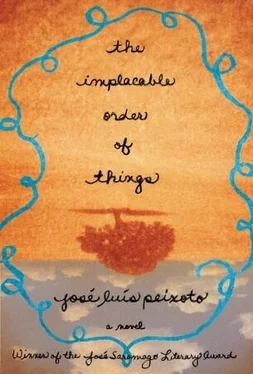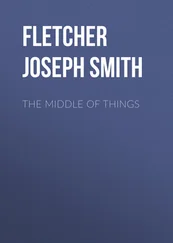I WALKED IN THE NIGHT. What led me to her wasn’t the streets. My foot and crutch trampled the parched earth and dust, but that wasn’t me, and I went forward in the night. And what I’m now calling night was a cool, black, and necessary silence, which wrapped me, and I perhaps floated. What led me wasn’t the streets. And yet, if I search my memory, I know I’ll find those streets that go from my house to hers, I know I’ll find people’s faces seeing me well dressed and saying good evening with a smile that wanted to say other things, I know I’ll remember the stars vaguely shining overhead. And all of this which I didn’t notice but which reached me like a forgotten remembrance, told by someone who assures me it was so, happened before the only thing that truly happened on that night, or in my life. And all that time from before seems to have lost its meaning. I lived inside a cloud during that time. Inside a cloud I learned the faded colors of the fog, and I believed that the earth was dull brown, that the grass was dull green, that the light didn’t exist. And in those final moments of that time before, ignorant and blind, I walked in the night. I climbed the last steps of the night. Almost there. Without realizing it. Before.
HE KNOCKED ON THE DOOR VERY LIGHTLY. He tapped the door very lightly with his knuckles. He let only the sound of his knuckles touch the door. The blind prostitute’s footsteps made no sound. The door opened. He reached for her face, but she was already retreating to the dim light of the kitchen. Her slender body was a shadow in the light of the lamp she’d lit for his sake. The blind prostitute was no more than thirty-some years old. People said she was the great-great-granddaughter of a baroness. Everyone had heard it from someone who had heard it from someone. What was known for certain is that she’d inherited her blindness and profession from her mother, who’d inherited them from her grandmother, who’d inherited them from her great-grandmother. Ten years ago the blind prostitute had a sad and honest, innocent-looking face. On the day her mother died, ten years ago, she didn’t cry. On that day, for the first time, she stuck her fingers into the cavities of her eyes and tried to discover what it meant to see, what it meant to cry. On that day, now buried under ten years of mourning, she felt relieved as her mother weakly breathed her last, and then she felt a great confusion in her hands, which groped at the walls as she walked about lost in the house she’d always known. And on that day, ten years ago, not a week had gone by since the morning when her mother had woken up with the old scars on her back and belly oozing tiny beads of blood, the morning when her mother got up and said get my bed ready for me to die. And with anxious haste, full of fear, the daughter cleaned the blood from her scars with towels, and new beads of fresh blood replaced the old ones in the very same places. The nights passed. The scars opened slowly, like brand-new sores. The amount of blood increased. And the daughter placed towels over the wounds, removing them only when she began to feel the warmth of the blood on her hands. No one came to visit them that week. On the night before she died, the mother mustered all her strength to run the palms of her hands over her daughter’s face, slowly, to see her. In the bedroom there was dried blood on the walls and floor, and the whole room smelled of blood. Blood was flowing from the mother’s skin like a raging river when it suddenly stopped. The daughter said nothing for a moment. Her mother stopped breathing. Master Rafael closed the front door and followed her to the bedroom. Ten years ago the blind prostitute’s mother had died in that bed, cold and pale, without a drop of blood left in her body.
First she, then he, sat down on the bed. The only light was what came in from the kitchen. Master Rafael didn’t need to see her to understand she had some news to share. She directed her missing eyes to a place where there was nothing and no one. The bedroom smelled stuffy, embarrassed. He placed his hand in her hands and understood from their hesitant and warm grasp, without a word spoken, that something would unite them forever. And all eternity, all silence, hinged on that moment. And when she took Master Rafael’s hand and placed it on the clothes covering her belly, his lips broke into what was perhaps a smile, and his enormous gaze looked for her. She wasn’t smiling. Only when he, in a child’s voice, said we’re going to get married, did her grave but serene expression soften into a gentle nod of simple, sheer joy.
I WALKED IN THE NIGHT. Returning home, imagining what it would be like to walk those streets with the certainty that she’d be waiting for me, I walked in the night. Imagining everything the same, the town fast asleep, the coolness, the calm, but with a profound and natural certainty. That was how I saw the life of married men. An additional certainty, strong and steady. A certainty. She would wait for me, my wife would wait for me, and the little boy would be sleeping, my son would be sleeping. I’d walk in the night, armed with this certainty. And as I crossed the town’s peacefulness, all the sounds, the crickets, the crescent moon, the barking dogs, the dogs answering each other from one side of town to the other, the dogs howling, it was all absolutely external to me, it was all a distant, perhaps impossible reality, beyond my skin and my gaze. But when I passed by the tiny fountain at the beginning of Salomão’s street, the sound of the water trickling from the spout and falling on the stone entered the night that was in me and made me stop. Leaning against a wall, I heard, in a blend of voices and memories, women talking and men shouting from afar and children singing an endless refrain;
I heard lame, I heard cripple, I heard half a man. I heard or remembered. I tried to forget. I leaned once more on my crutch and went on, fooling myself, thinking how little their talk mattered, how it was nothing, how it would all end on the day I married her, on the day our son was born. I broke the silence to open the door to my house and, closing it, I returned the house and the world to silence. Slowly. The vast darkness. I sat on a chair and greatly wished my father were alive. Dad, I’m going to get married. Dad, I’m going to have a son, you’re going to have a grandson. Dad, I’m happy.
THE KITCHEN, BESIDES ITS DOORS, had a single small window looking out onto the backyard. When morning arrived with its sounds and bustle and growing light, it entered by that window. Master Rafael was still in the chair where he’d sat down after arriving home from the blind prostitute’s house. And the square of light that came through the window spread across the floor in a long rectangle that touched the foot of Master Rafael, climbing up his leg and torso to his face. His gaze was that of someone who’d thought of many things. Cracking the joints of his knee and his spine, he stood up. In his bedroom he got dressed for work. He didn’t light the stove, he drank no coffee, and he went out. Outside he felt as if the dawn were greeting him. In the morning clarity, the whitewashed walls were brighter, the earth and dust and stones cooler. Torpid, half-asleep dogs eyed Master Rafael. Swallows flew close to the ground, like harmless volleys from a slingshot. Putting his weight on the wooden crutch, then on his one leg, his staggered way of walking seemed steadier and surer to him that morning. When he reached the carpenter’s shop there was a glow over the roof and over the yard that he didn’t notice. No one was waiting for him at the gate. He was the first to arrive. He walked through the shavings and sawdust, between the table and the benches, and opened the window. The air was fresh, his breathing fresh. And for the first time a voice inside him spoke up and said she bestows her favors on lots of men, how can I be sure the child is mine? And immediately, without an intervening second, he felt ashamed for having doubted. He went to the bench and took up the plane. The boards of the doorframe he was making were where he had left them the previous evening, but with more time, with a layer of time on them, like a layer of dust. He began planing them. A short while later the apprentice arrived. Good morning. Then Salomão.
Читать дальше












